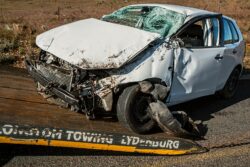Arkansas Car Accident Laws: Your Legal Duty After an Accident
Navigating the aftermath of a car accident can be as complex as a labyrinth. This article elucidates the legal obligations of drivers in Arkansas following a vehicular accident, underlining the necessity of information exchange, assistance provision, and accident reporting.

The potential penalties for non-compliance are also addressed. Lastly, the role of attorneys in providing guidance through these intricate laws is highlighted.
Key Takeaways
- Arkansas drivers must exchange personal details after a car accident, including their name, address, and vehicle registration number.
- Drivers involved in an accident resulting in injury or death must provide reasonable assistance to the injured person, including transportation for medical treatment if necessary.
- Crashes resulting in injury, death, or property damage of $1,000 or more must be reported to the police immediately.
- Failing to report a crash that is legally required can lead to fines, license revocation, and other legal consequences.
Understanding the Importance of Information Exchange After an Accident
In accordance with Arkansas car accident laws, the exchange of pertinent information such as name, address, and vehicle registration number, is a crucial requirement following a vehicular accident, contributing significantly to the post-incident legal processes.
This practice aims to ensure proper documentation, facilitating efficient resolution of potential disputes and aiding in the subsequent legal proceedings. Failure to comply with this requirement may lead to legal consequences including fines and license revocation.
Additionally, this information is essential in determining fault, assessing damages, and processing insurance claims. The emphasis on information exchange underscores the importance of transparency and accountability in accident situations.
Therefore, understanding and adhering to these requirements is critical to maintain legal compliance post-accident.
Obligations to Provide Assistance in Accidents With Injuries
Obligations to render aid in situations involving vehicular collisions with resultant injuries mandate the provision of reasonable assistance to those harmed, including, if necessary or requested, transportation for medical treatment. This duty to transport is not a mere courtesy but a legal responsibility that carries consequences of neglect.
- The law necessitates that drivers involved in accidents causing injury or death provide reasonable assistance to the injured. This includes, if necessary or requested, transportation for medical treatment.
- Failure to fulfill this duty to render aid can result in legal consequences, including fines and revocation of the driver's license.
- The penalties for neglecting this duty underscore the importance of understanding and adhering to these obligations as part of responsible driving behavior.
Penalties for Neglecting to Report a Car Accident
Penalties for failing to report a vehicular collision can be severe, ranging from monetary fines to the revocation of the driver's license. The consequences are dictated by the gravity of the non-compliance with reporting requirements.
| Consequences of Non-Compliance | Severity of Penalty |
|---|---|
| Monetary Fine | Ranges from $100 to $1,000 |
| License Revocation | Permanent revocation in cases of deliberate failure to report |
| Passenger Penalty | Applicable if passengers neglect to report when driver is incapacitated |
| Legal Consequences | Failure to comply with reporting requirements is punishable by law |
| Authority | The Secretary of the Department of Finance and Administration has revocation powers |
The law places an emphasis on the importance of reporting, recognising its role in maintaining order and safety on the roads. Non-compliance is viewed as a serious violation, with penalties reflecting this stance.
Duties in Accidents Resulting in Property Damage Only
When only property damage is involved in a vehicular collision, specific duties are imposed on the drivers, including stopping at the scene, not obstructing traffic, and exchanging pertinent information. Understanding insurance coverage is vital in such situations, as it can significantly influence how the damages are addressed.
- Steps to take after a car accident include promptly informing the insurance company about the incident, providing an accurate account of the event, and submitting any necessary documentation.
- Additionally, obtaining the other driver's insurance details is essential to facilitate the claim processing.
- Photos of the damage can be beneficial when settling claims and disputing liability.
Adherence to these duties and steps ensures that the drivers fulfill their legal obligations and facilitates smoother resolution of property damage claims.
The Role of Attorneys in Navigating Arkansas Car Accident Laws
Navigating the complexities of motor vehicle collision regulations can significantly benefit from the expertise of legal professionals. The role of attorneys in interpreting and applying Arkansas car accident laws is crucial in ensuring the rights and interests of individuals are protected. The importance of legal representation is underscored by the intricacies of these laws and the potential consequences for non-compliance.
| Role of Attorneys | Duties | Importance |
|---|---|---|
| Legal Advice | Provide guidance on laws and procedures | Ensures compliance with Arkansas car accident laws |
| Representation | Act on behalf of clients in legal proceedings | Protects the interests of clients |
| Negotiation | Liaise with insurance companies for claim settlements | Facilitates fair compensation for damages |
| Investigation | Collect and analyze evidence related to the accident | Strengthens the client's case |
| Advocacy | Defend clients' rights and argue their case | Maximizes the potential for a favorable outcome |
Frequently Asked Questions
What Legal Recourse Do I Have if the Other Driver Refuses to Exchange Information After an Accident in Arkansas?
In Arkansas, if a driver refuses to exchange information post-accident, legal intimidation or police involvement may be necessary. The aggrieved party should promptly report to law enforcement, detailing the refusal.
This non-compliance is a legal offense, and authorities can enforce compliance. If the refusal persists, a lawsuit could be initiated to compel the exchange of information. Legal counsel can guide in these proceedings, ensuring adherence to Arkansas' car accident laws.
If I Am a Passenger in an Accident, What Are My Responsibilities if the Driver Is Unable to Report the Accident?
In Arkansas, if a driver is incapable of reporting a vehicular accident, passengers bear the responsibility. The post-accident protocol mandates alerting the nearest law enforcement agency promptly.
Passengers are required to fully cooperate with the investigating officer, ensuring that essential details of the accident are accurately relayed. This constitutes a crucial component of passenger rights, emphasizing their role in legal proceedings following an accident.
Failure to comply could result in penalties, underlining the importance of adherence to these regulations.
How Can I Protect My Legal Rights if I Am Involved in a Hit-And-Run Accident in Arkansas?
In a hit-and-run scenario in Arkansas, safeguarding legal rights necessitates swift action. Immediate police involvement is crucial to document the incident and initiate an investigation. Gathering evidence at the accident scene, such as photographs or witness statements, can support the case.
Engaging legal representation expedites the process of claiming insurance or pursuing legal recourse. The attorney can guide through the legal complexities and ensure all statutory obligations are met.
What Steps Should I Take if the Other Driver Involved in the Accident Is Uninsured or Underinsured?
In the event of an accident with an uninsured or underinsured driver in Arkansas, certain steps should be taken. It is vital to contact law enforcement and provide an accurate account of the incident. Subsequently, one's own insurance company should be notified.
Underinsured or Uninsured Motorist Coverage, if included in one's policy, can cover costs exceeding the policy limits of the underinsured driver or costs incurred if the other driver is uninsured.
Legal counsel may be beneficial to navigate these scenarios.
How Do I Go About Seeking Compensation for My Damages if the Other Driver Is at Fault in the Accident?
In cases where another driver is deemed at fault in a vehicular accident, the injured party may seek compensation for damages. This often involves the submission of a medical expenses claim to the at-fault party's insurance provider.
The fault determination process, generally conducted by insurance adjusters, plays a crucial role in this scenario. It involves assessing evidence from the accident scene and statements from involved parties to establish who bears responsibility for the accident.

This post has been generated by AI and was not reviewed by editors. This is Not legal advice. Please consult with an attorney.




